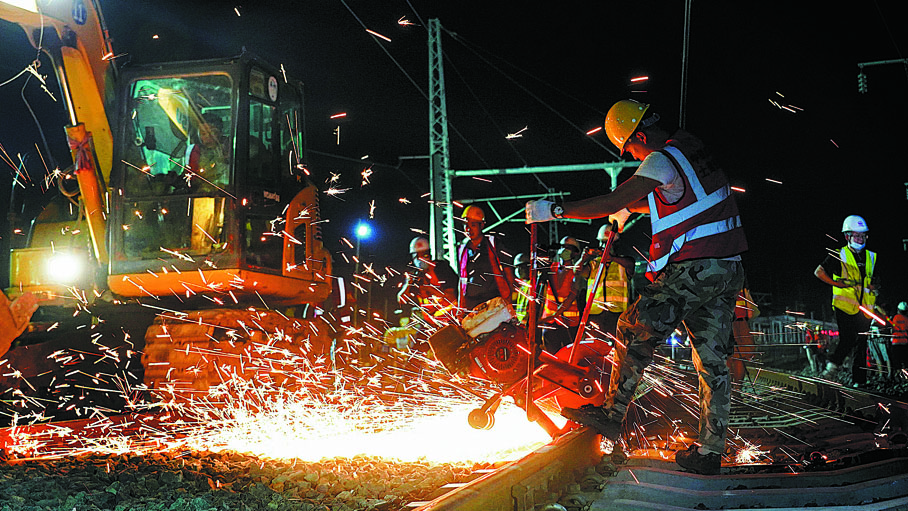Major projects expected to stabilize investment

Workers replace railway track during construction of the Anqing-Jiujiang High-Speed Railway in Jiujiang, Jiangxi province, on Tuesday. The high-speed railway line, which links Anqing in Anhui province with Jiujiang, is expected to be completed and operational by the end of this year. (WAN XIANG/XINHUA)
Input on high-tech sectors shows local govts' greater emphasis on efficiency
China's intensified efforts to accelerate the implementation of major projects across the nation are playing a key role in stabilizing investment, promoting the steady recovery of domestic demand and providing support to overall economic growth, said experts.
They said the acceleration of investment growth might be more visible by end of this year and early next year, saying that fiscal policy should perform a much stronger role to boost the new type of infrastructure construction this year.
Since early 2021, various regions across the nation have been ramping up efforts to speed up the construction of major projects, especially in fields related to new infrastructure, urbanization and key projects.
Last month, Tianjin, a port city in northern China, launched 446 key projects involving a total investment of 310.7 billion yuan ($48 billion), among which 195 are strategic emerging industrial projects such as high-end equipment manufacturing, biomedicine and big data centers. Between January and June, the city's investment in high-tech industries increased by 36.3 percent year-on-year.
China's southwestern Guizhou province is also actively expanding investment. The province launched 118 key projects with a total investment of 91 billion yuan by the end of July, covering a wide range of fields including advanced equipment manufacturing, big data and new energy vehicles.
Zhou Maohua, an analyst at China Everbright Bank, said the rapid growth of investment in high-end manufacturing and high-tech sectors has shown local governments' greater emphasis on investment efficiency.
He cited data from the National Bureau of Statistics, saying that the 23.5 percent year-on-year growth of investment in high-tech industries during the first six months of this year is taking place amid the accelerated industrial transformation and upgrading resulting from China's consumption upgrade.
Zhou's views were echoed by Tao Jin, deputy director of the macroeconomic research center of the Suning Institute of Finance, who said investment in new infrastructure, new urbanization initiatives and major projects is key to expanding effective investment.
He said more efforts should be made to encourage the private sector's participation in investment and improving its performance in both the distribution of incomes and the assignment of project management rights and responsibilities.
Experts said the country's key focus on accelerating the implementation of key projects is in line with this year's Government Work Report.
According to the report, the central government will earmark a total of 610 billion yuan for investment in its budget. And the country will issue special-purpose local government bonds totaling 3.65 trillion yuan this year, with priority given to funding key projects under construction.
Shan Hui, Goldman Sachs' chief China economist, said in a research note on Wednesday that the Chinese government's on-budget fiscal expenditure and government bond issuance would still provide support to overall economic growth.
This should help reduce market participants' concerns on whether fiscal policy would be supportive amid tightened regulations on local government financial vehicles in the second half of this year, Shan said.
"The government's pace of bond issuance could be a bit more back-loaded toward the fourth quarter, and thus the acceleration of investment growth might be more visible by end of this year and early next year," Shan said.
Looking forward, China faces downward pressure on investment growth in the second half of this year, especially in terms of real estate and infrastructure investment, said Zhang Bin, a senior researcher at the China Finance 40 Forum, or CF40.
However, under the constraint that the growth rate of fiscal budgetary expenditure in the whole year is set at 1.8 percent, and the tightening of supervision on local governments' implicit debt growth, moderate infrastructure investment may be a trend in the long run, Zhang said.
The short-term stimulus of direct government-led investment to expand demand could drive up economic growth rapidly, while it also has disadvantages, such as adding potential debt risk, Zhang said.
Ming Ming, a senior analyst at CITIC Securities, said that monetary policy cannot be used alone to support economic growth in the coming months, adding that fiscal policy should perform much stronger.
Relying too much on monetary easing may lead to a liquidity trap as well as a shortage of investment assets. Thus, fiscal actions should boost new types of infrastructure construction and green credit, said Ming.
Photos
Related Stories
- China's top political advisor stresses expanding domestic demand
- China's wealth set to increase faster than U.S. in next five years: media
- Means of production prices rise in China
- Strong start to 2021, China economy powers ahead for high-quality growth
- China's PMI rebounds as economy continues expansion
Copyright © 2021 People's Daily Online. All Rights Reserved.










